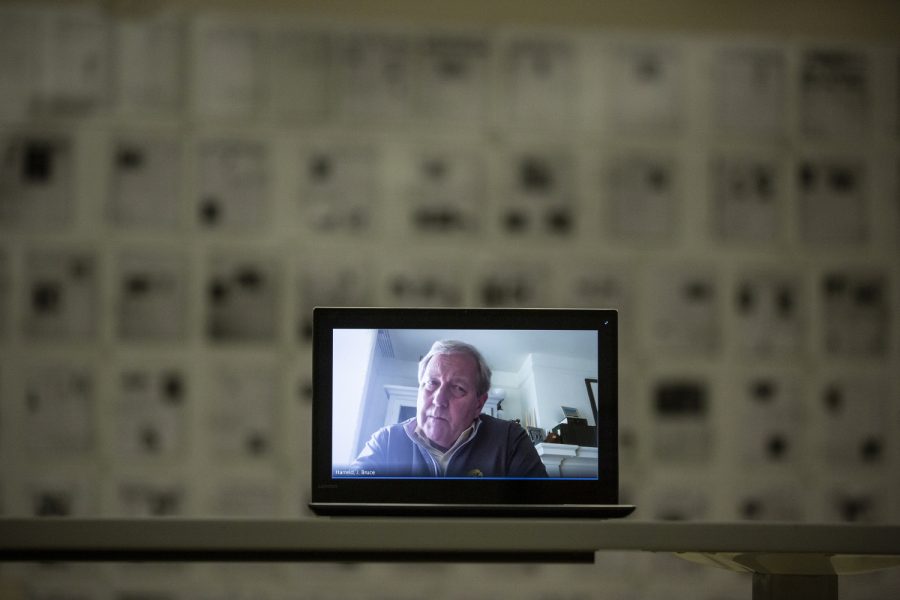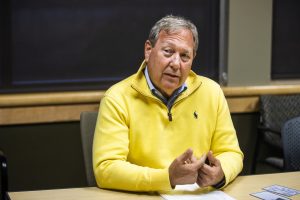‘It’s been Hell and I think we’re ready for a transition’ Harreld looking to new testing, depopulation options for spring semester
As the university plans ahead for spring semester, several options to decrease the spread of and potential outbreaks of COVID-19 on campus are being discussed.
President Bruce Harreld speaks during a virtual interview with The Daily Iowan on Sept. 29, 2020.
December 13, 2020
The University of Iowa is looking at various plans for how to ensure there is more testing accessible to students and there is not a COVID-19 outbreak in the spring semester.
In an interview with The Daily Iowan on Dec. 11, UI President Bruce Harreld said the university is still working to create a concrete plan for a mostly online spring semester — one option including bringing students back to campus in phases.
“I suggested earlier this week to some people from the [Critical Incident Management Team] in a conversation that maybe we should phase our students coming back so we don’t have a big crush,” he said. “Maybe a quarter over or maybe over a couple of weeks at a time, to relieve some of that pressure.”
The UI made national headlines as it brought students back to campus for soaring positivity rates among students. But Harreld pointed to zero student hospitalizations, and little student-to-faculty transmission as a positive sign.
He said there is no timeline for announcing specific spring semester plans to ensure the final preparations and plans for the spring are the best they can be.
“I think we have flexibility here,” he said. “I’d rather than say we’re going to announce it in a week and we need an answer, let’s work on the issue. Let’s watch and see where the virus is going and see what the CDC is doing.”
Regardless of new plans and an unknown vaccination timeline, Harreld said the spring semester will look a lot like the fall. College students are expected to be one of the last priority groups to receive a vaccine. The two-dose Pfizer vaccine was approved Friday for rollout, and UI Hospitals and Clinics is expecting about 1,000 doses for their COVID-19 unit employees in the coming days.
Harreld said he is proud of students and the Iowa City community for wearing masks and social distancing.
“As I walk across campus, we’ve been socially distancing and masking,” he said. “You guys are doing a great job and I actually thought our residence halls were going to be more problematic. They have not been. We’ve been pretty safe…We haven’t had a single student in the hospital. We haven’t had a single case where we can find transmission from students to faculty members, which was a big fear for a lot of the faculty.”
Alongside looking at different options for the spring semester, Harreld said the university is looking at how they can expand testing.
As the DI previously reported, Professor of Internal Medicine and Pathology Dan Diekema said the UI plans to expand surveillance testing and screening at the university, emphasizing the importance of testing more than just symptomatic students while presenting at a Dec. 8 Faculty Senate meeting.
Harreld said the UI is looking at testing asymptomatic students, but is cautious as to how the testing supply will impact how many people can be tested.
“I really think the public health officials are right, that testing and surveillance testing is a really important part of the puzzle,” he said. “But if you don’t have the tests, you can’t do the surveillance testing.”
As cases spiked on campus in August and September, Harreld said he and other university leaders were in talks to bring a state-run Test Iowa site to campus, which would have allowed people without symptoms to get a test. Student Health and UIHC require people to have experienced a COVID-19 exposure or have symptoms in order to qualify for a test. The nearest Test Iowa site is in Linn County. Ultimately, Harreld said, the company operating Test Iowa opted not to open a test site because, according to Harreld, there wasn’t the lab resources to begin that many tests.
“We need to be very, very careful that we don’t do something like open a test site that takes all of the testing capacity in the lab work and diverse it because we have some really sick patients,” Harreld said.
The governor’s office did not respond to a request for comment.
Harreld, who has been an ardent supporter of closing bars and clubs, said he is concerned about surveillance testing being just a point in time and not offering enough information.
“We ought to talk a lot about the off-campus restaurant and bar scene and the night scene, because if we do all that testing, which feels good, it’s only good for the moment of the test,” he said. “And if people are going to have environments around the campus that are really really dangerous and the rest of the county isn’t doing things to keep people out of those sorts of environments, then I don’t know.”
As for a spring commencement ceremony, Harreld said the UI is planning on a virtual one, but leaving the option to do an in-person ceremony open in case the UI feels it’s safe.
“My operating assumption is it’s going to look virtual,” Harreld said. “Because here’s why. We need to plan that. It’s got a lot of things we have to videotape and get all that together. And if we get all that together, we can then throw it away and have a live one relatively easily. And I hope that’s where we end up.”
All the university’s plans are still fluid, he said, and there are several probable solutions that are being worked on. While there wasn’t a spike after Thanksgiving like he initially thought, Harreld said he is taking into account everything that has happened this semester when looking to containing the spread of COVID-19 in the spring.
“It’s been Hell and I think we’re ready for a transition,” he said. “Please, please, please, to everyone, don’t relax because the vaccine is here. It’s not here. You haven’t been vaccinated yet. None of that counts until it’s in our system, so let’s continue doing what we’re doing.”






